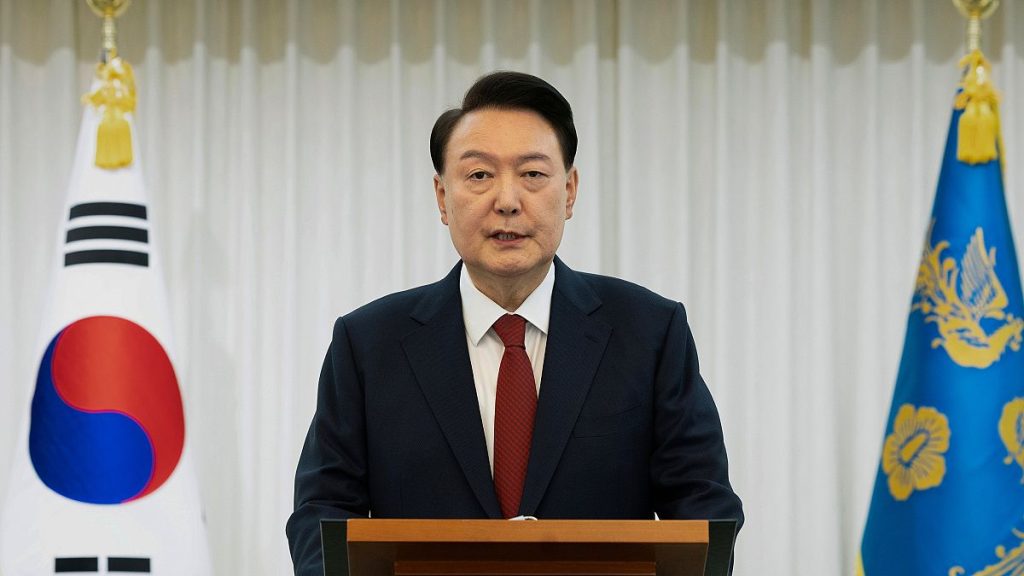The political landscape of South Korea is currently embroiled in a high-stakes legal and constitutional crisis centered around the impeached President Yoon Suk-yeol. The controversy stems from a short-lived martial law decree imposed by Yoon on December 3rd, a decision that has spiraled into accusations of rebellion and abuse of power, ultimately leading to his impeachment by the National Assembly. The latest development in this unfolding drama is a warrant request filed by South Korean investigators seeking Yoon’s detention, a move that hinges on the approval of the Constitutional Court and adds another layer of complexity to an already volatile situation. This request for detention marks a critical juncture in determining the course of South Korea’s political future.
The core of the legal battle revolves around the allegations of rebellion and abuse of power leveled against Yoon in connection with the martial law decree. Investigators, after encountering resistance from Yoon in their attempts to secure his cooperation with the investigation, have escalated their efforts by seeking a warrant for his detention. Yoon’s legal team has countered this move, arguing that the anti-corruption agency pursuing the case lacks the jurisdictional authority to investigate charges of rebellion. They further assert that an incumbent president, even one under impeachment, cannot be prosecuted for abuse of power, citing the principle of presidential immunity and emphasizing the need for utmost restraint in any such investigation. This legal standoff sets the stage for a potentially protracted legal battle that will test the limits of presidential power and the scope of investigative agencies’ reach.
The warrant request reflects a growing tension between the investigators and Yoon, who has repeatedly declined to appear for questioning and has obstructed searches of his offices. While presidential immunity shields him from prosecution for most criminal offenses, this protection does not extend to charges of rebellion or treason, leaving Yoon in a precarious legal position. The court’s decision on the warrant request holds significant weight, as it will determine whether Yoon can be compelled to cooperate with the investigation and potentially face detention, a scenario unprecedented in South Korean history. The legal complexities surrounding presidential immunity, coupled with the sensitive nature of the charges, make this a highly delicate and consequential legal proceeding.
Adding to the complexity of the situation is the inherent challenge of enforcing a potential detention order against a president, even one under impeachment. South Korean law mandates the consent of the person in charge to search locations associated with military secrets, making it improbable that Yoon would voluntarily comply with a detention order. Furthermore, the prospect of forced detention raises serious concerns about potential clashes with Yoon’s presidential security detail, a scenario with unpredictable and potentially destabilizing consequences. The delicate balance between upholding the rule of law and respecting the vestiges of presidential authority creates a challenging dilemma for the authorities tasked with enforcing any potential court order.
The impeachment vote by the National Assembly on December 14th, triggered by the controversial martial law decree, has effectively suspended Yoon’s presidential powers, plunging the country into a period of political uncertainty. This period of instability has disrupted high-level diplomatic engagements, created volatility in financial markets, and fueled anxieties about the country’s future direction. The impeachment, while a significant step, does not automatically remove Yoon from office. His ultimate fate now rests with the Constitutional Court, which is currently deliberating the validity of the impeachment and will ultimately decide whether to uphold the impeachment and formally remove him from office or to reinstate him to his presidential duties.
The Constitutional Court’s deliberations are now the focal point of the political crisis. Their decision will not only determine Yoon’s personal fate but will also have profound implications for the stability of the South Korean government and its democratic processes. The court’s ruling will set a precedent for future presidential impeachments and define the boundaries of presidential power in times of crisis. As the nation awaits the court’s decision, the tension remains palpable, with the future of the presidency and the stability of the country hanging in the balance. This period of uncertainty underscores the fragility of democratic institutions and the importance of upholding the rule of law, even in the face of extraordinary circumstances.














